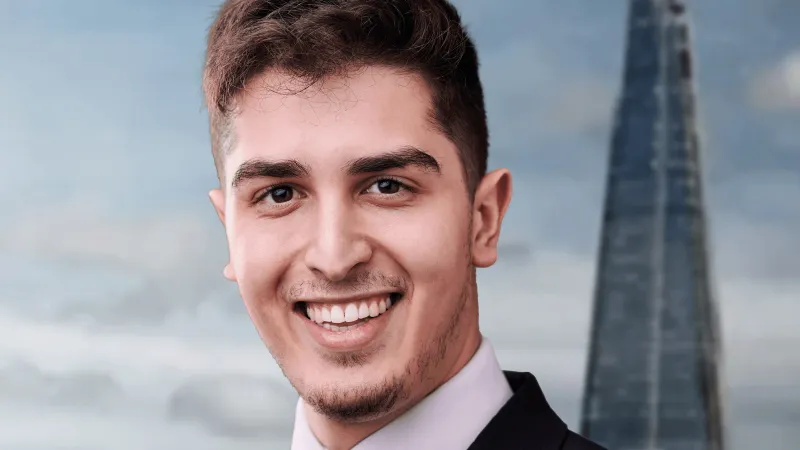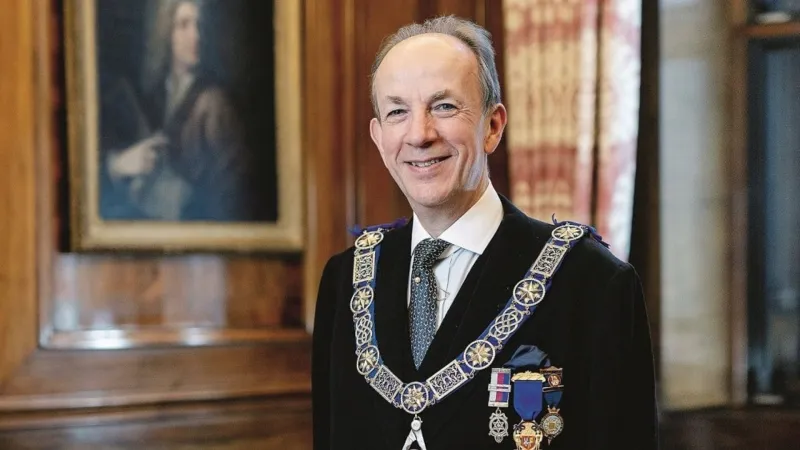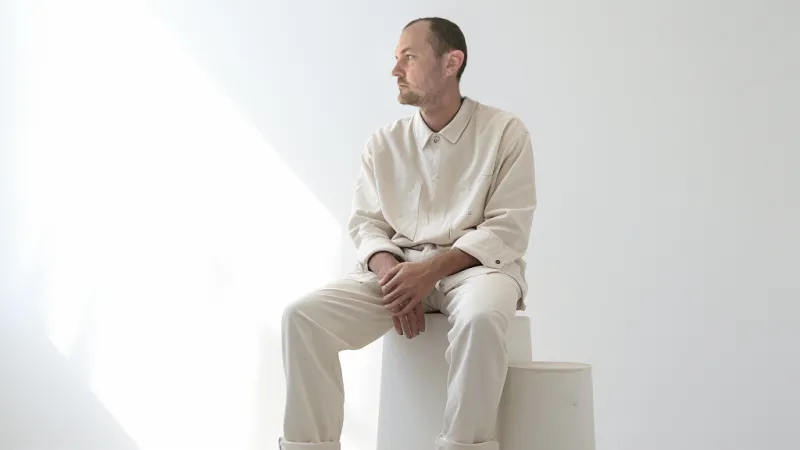When Sir Paul Williams welcomes visitors to the office of the Masonic Charitable Foundation (MCF, the Freemasons' Charity) in the lower ground floor of Freemasons' Hall, he describes it as the guts of the building. That's a fittingly corporeal metaphor for Sir Paul, who spent a heavyweight career in health managing hospitals, NHS trusts and, eventually, the entire Welsh NHS.
Sir Paul is now chairman of the MCF, having replaced James Newman in May. Previously, he chaired the RMBI Care Co (Royal Masonic Benevolent Institution Care Company), which in the spring of 2020 was in the frontline of the COVID-19 pandemic that ravaged the care home sector. The RMBI board acted quickly, with the support of the MCF, to do all it could to protect the residents and staff. Thankfully the RMBI Homes are now in a positive phase of recovery. Sir Paul says the MCF is preparing its response to provide support in a post-pandemic world, both for the membership and the wider community dealing with long-COVID, post-viral fatigue, NHS waiting times, mental health and social inequality.
It might be a coincidence that both Sir Paul and Dr David Staples spent the bulk of their careers in the NHS, but it means that Freemasonry is equipped to face the pandemic-related challenges of the coming years. Sir Paul wants to closer align the MCF’s objectives with those of the UGLE. ‘Our big opportunity is to work much more closely with UGLE,’ he says. ‘We are autonomous in terms of governance, but we need to ensure we have complementary strategies as there will be so much more we can offer to strengthen the organisation. The MCF springs entirely from the Craft and the support of the membership. We want to align as closely as possible without living in each other’s pockets, and develop a true partnership as that can only benefit Freemasonry.’
Cardiff-born Sir Paul started working in hospital administration after finishing his A-levels, completing his first professional qualifications while working at the Welsh Hospital Board. He was fast-tracked onto the NHS graduate scheme where he rotated through pretty much every job in the hospital. On his very first day on the NHS graduate scheme, Sir Paul, then 21, found himself working in a hospital mortuary in Taunton assisting on a post mortem. ‘It was quite a rite of passage,’ he says.
By the age of 23, Sir Paul was taking charge of a 600-bed psychiatric hospital. A stellar career followed, culminating in Sir Paul’s appointment as chief executive for NHS Wales and Director General of Health and Social Services, a role that made him directly responsible for around 45 per cent of the Welsh Government’s budget.
f there’s one thing that defines Sir Paul’s approach to life, it’s a thirst for learning. This is something he acquired while completing his first professional qualification, recognising a direct connection between education and work. ‘That has stayed with me all my life,’ he says. Sir Paul’s CV now includes an honorary fellowship, doctorate and visiting professor from South Wales universities, Past President of the Institute of Health Services Management and Companion of the Chartered Institute of Management. Another influence could be the strong tradition of self-improvement in South Wales, which saw miners operate their own institutes and libraries.
‘I have always supported the underdog,’ he says. ‘Taking the approach that people probably have greater potential than they give themselves credit for. People need opportunities, and role models.’It’s an attitude that helped Sir Paul thrive through at least nine major reorganisations of the NHS, and then make the step into the civil service as chief executive of NHS Wales. And when retirement beckoned in 2012, it meant he found new challenges – joining the board of Natural Resources Wales when it formed as an integration of three existing bodies, and then working with charities including the Royal Voluntary Service and St John Ambulance Cymru, for which he is currently Prior for Wales.
Around this time, he was invited to bring his professional expertise to the board of the RMBI. As a seasoned NHS integrator, he could anticipate the challenges presented by the forthcoming formation of the MCF from the four masonic charities, but he also understood the complexities of social care. Here, an anecdote offers a good insight into his philosophy. As Chairman for the Province of South Wales 2021 RMBI Festival, he set a target of raising £5 million by November 2021. ‘My vice chairman thought that was an awful lot, but I said that first you need to set a stretching target and, second, it’s just like a change management programme,’ he says. ‘He looked at me, wondering where on earth I was coming from. But what I meant is that you need an objective worth going for, and then you need people to believe in it and to follow it. That’s how you achieve ownership. It helps that we have an RMBI home in our Province because you cannot take Freemasons’ giving for granted. You need to give them a reason why. So, we engage continually throughout the Festival explaining the wonderful work provided by the RMBI and the MCF.’
When he was 30, Sir Paul was approached by a couple of doctors – he was always able to bridge the gap between medical and managerial cultures at the NHS – and invited to become a Freemason. He joined Dinam Lodge No. 4521 in Penarth just outside Cardiff, a lodge with strong medical connections. It was named after Lord David Davies of Llandinam, a Welsh industrialist, politician and philanthropist who founded the Temple of Peace and Health in Cardiff, a building that once housed the Welsh Hospital Board. Freemasonry’s core values chimed with Sir Paul’s principles, while the degrees and orders gave him further avenues for self-education.
‘Freemasonry became a companion to my approach to learning and development because it gave an insight into oneself,’ he says. ‘It provided an opportunity to know yourself and emphasised the importance of integrity, listening, empathy, education, doing as much as you can with your life, charity, compassion – those things I understood intuitively. The values of Freemasonry stand the test of time and if they are practised properly can add value to your life. It gave me an inner strength.’
That resolve was tested when Sir Paul’s masonic connections became front-page news in the Welsh press just as he prepared to become chief executive of NHS Wales. It was a ‘stomach-churning moment’ but one that ultimately worked in his favour as Sir Paul received the full backing of his peers.
‘It was the best thing that happened to me because it meant I was outed and it didn’t have the effect on my career they wanted,’ he says.
It’s a career that seems to find a natural fruition at the MCF. Here, his years in public service, his love of charity and Freemasonry, and his skills in management, administration and leadership come together for the benefit of a great cause and venerable institution. ‘I feel honoured at being given this opportunity,’ he says. ‘There are 300 years of heritage, and to be in a position to have some influence in an organisation with that tradition – well, it’s quite humbling and brings great responsibilities. We have to make sure that money is spent wisely and effectively while looking after the reputation of the organisation, and we are continually horizon-scanning to see where we fit into the charity sector. People still don’t understand how much Freemasons contribute, but we want to be recognised as a genuine force for good.’




